- Clone
- W16060A (See other available formats)
- Regulatory Status
- RUO
- Other Names
- Focal adhesion kinase 1, FAK1, FRNK, Protein-tyrosine kinase 2, PTK2
- Isotype
- Rat IgG2a, κ
- Ave. Rating
- Submit a Review
- Product Citations
- publications
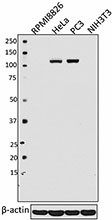
-

Total cell lysates (15 µg protein) from RPMI8826 (negative control cell line), HeLa, PC3 and NIH3T3 were resolved by 4-12% Bis-tris gel electrophoresis, transferred to nitrocellulose, and probed with 1 µg/mL purified anti-FAK (clone W16060A) antibody. Proteins were visualized using a goat anti-rat-IgG secondary antibody conjugated to HRP (clone Poly4054) and chemiluminescence detection. Direct-Blot™ HRP anti-β-actin (clone 2F1-1) antibody was used as a loading control. -

HeLa cells were fixed with 4% paraformaldehyde (PFA) for 15 minutes, permeabilized with 0.5% Triton X-100 for three minutes, and blocked with 5% FBS for 60 minutes. Then the cells were intracellularly stained with 0.5 µg/ml anti-FAK antibody (clone W16060A) overnight at 4°C followed by Alexa Fluor® 594 (red) conjugated goat anti-rat IgG (clone Poly4054) for one hour at room temperature. Nuclei were counterstained with DAPI (blue). The image was captured with a 60X objective.
| Cat # | Size | Price | Save |
|---|---|---|---|
| 694001 | 25 µg | ¥22,220 | |
| 694002 | 100 µg | ¥58,300 |
FAK (Focal adhesion kinase) is an intracellular, highly conserved, nonreceptor tyrosine kinase encoded by PTK2 located on human chromosome 8q24.3. It is ubiquitously expressed in all cells and was initially identified in v-Src transformed chicken embryo fibroblasts. FAK is a multi-functional regulator of cell signaling within the tumor microenvironment. During development and in various tumors, FAK promotes cell motility, survival and proliferation through kinase-dependent and -independent mechanisms. FAK is associated with many aspects of metastasis such as adhesion, migration and invasion. FAK is overexpressed and activated in a variety of cancers including ovary, colon, breast, lung, thyroid, head and neck, liver, pancreatic and esophageal and is correlated with poor survival rates. Small molecule FAK inhibitors are emerging as promising chemotherapeutics, as FAK inhibition in mouse models prevents tumor growth, metastasis, vascular permeability, and angiogenesis.
Product DetailsProduct Details
- Verified Reactivity
- Human
- Antibody Type
- Monoclonal
- Host Species
- Rat
- Immunogen
- Partial human FAK (701-950 a.a.) expressed in E. coli.
- Formulation
- Phosphate-buffered solution, pH 7.2, containing 0.09% sodium azide.
- Preparation
- The antibody was purified by affinity chromatography.
- Concentration
- 0.5 mg/ml
- Storage & Handling
- The antibody solution should be stored undiluted between 2°C and 8°C.
- Application
-
WB - Quality tested
ICC - Verified - Recommended Usage
-
Each lot of this antibody is quality control tested by Western blotting. For Western blotting, the suggested use of this reagent is 0.25 - 1.0 µg per ml. For iimmunocytochemistry, a concentration range of 0.5 - 2.0 μg per ml is recommended. It is recommended that the reagent be titrated for optimal performance for each application.
- Application Notes
-
Clone W16060A does not cross-react with mouse (in-house tested).
- Product Citations
-
- RRID
-
AB_2650721 (BioLegend Cat. No. 694001)
AB_2650721 (BioLegend Cat. No. 694002)
Antigen Details
- Structure
- 1052 amino acids with a predicted molecular weight of 119 kD.
- Distribution
-
Cell junction, cell membrane, cytoplasm.
- Function
- Plays an essential role in regulating cell migration, adhesion, spreading, reorganization of the actin cytoskeleton, formation and disassembly of focal adhesions and cell protrusions, cell cycle progression, cell proliferation and apoptosis.
- Interaction
- Interacts with CAS family members, including BCAR1, BCAR3, CASS4 and NEDD9. Interacts with GIT1, SORBS1, ARHGEF28, SHB, PXN, TLN1, STAT1, DCC, WASL, ARHGEF7, GRB2 and GRB7, BMX, TGFB1I1, STEAP4, ZFYVE21, ESR1, PIK3R1 or PIK3R2, SRC, FGR, FLT4, RET, EPHA2.
- Biology Area
- Cell Adhesion, Cell Biology, Cell Motility/Cytoskeleton/Structure, Signal Transduction
- Molecular Family
- Protein Kinases/Phosphatase
- Antigen References
-
1. Kanteti R, et al. 2016. Oncotarget. 7:31586.
2. Schaller MD, et al. 1992. Proc. Natl. Acad. Sci. USA 89:5192.
3. Sulzmaier FJ, et al. 2014. Nat. Rev. Cancer 14:598.
4. Parsons JT. 2003. J. Cell Sci. 116:1409.
5. Zhao J, Guan JL. 2009. Cancer Metastasis Rev. 28:35.
6. Goode EL, et al. 2010. Nat. Genet. 42:874.
7. Cancer Genome Atlas Network. 2012. Nature 490:61.
8. Sood AK, et al. 2010. J. Clin. Invest. 120:1515.
9. Ward KK, et al. 2013. Clin. Exp. Metastasis 30:579.
10. Jean C, et al. 2014. J. Cell Biol. 204:247.
11. Cabrita MA, et al. 2011. Mol. Oncol. 5:517. - Gene ID
- 5747 View all products for this Gene ID
- UniProt
- View information about FAK on UniProt.org
Related FAQs
Other Formats
View All FAK Reagents Request Custom Conjugation| Description | Clone | Applications |
|---|---|---|
| Purified anti-FAK | W16060A | WB,ICC |
Customers Also Purchased
Compare Data Across All Formats
This data display is provided for general comparisons between formats.
Your actual data may vary due to variations in samples, target cells, instruments and their settings, staining conditions, and other factors.
If you need assistance with selecting the best format contact our expert technical support team.





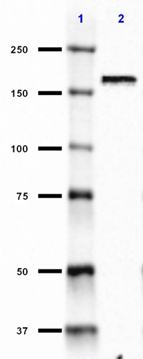
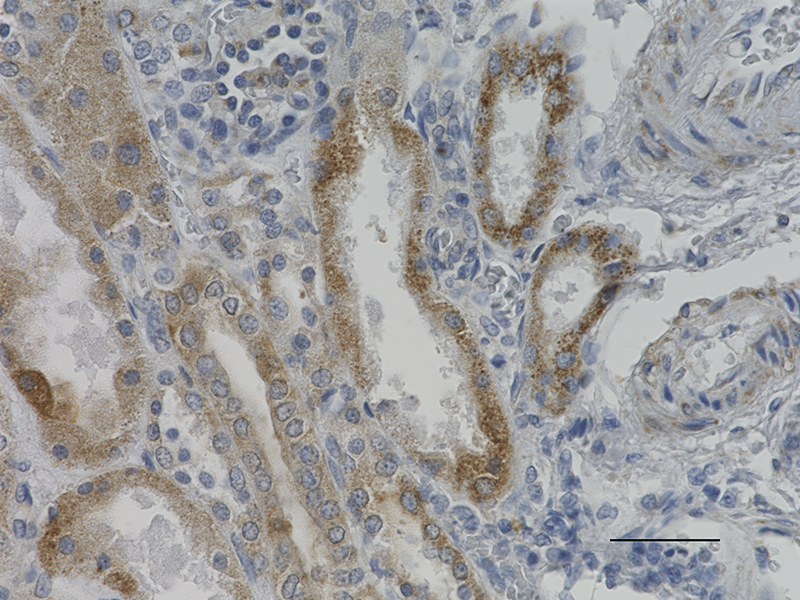

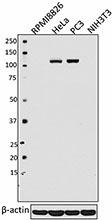
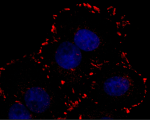



Follow Us